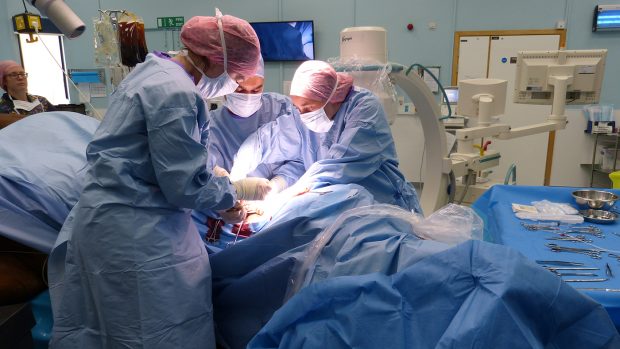It is important that you know your own horse’s normal temperature, pulse and respiration so you can spot any changes.
The average healthy horse has a pulse of 35-42 beats per minute at rest, although this will vary in individual animals depending on a variety of factors such as age, breed and degree of fitness. This can increase to more than 200 beats per minute when a horse is galloping hard.
The heartbeat in the horse is most easily felt on the left side of the lower chest where the girth would go, just behind the elbow. It can also be felt where the facial artery passes under the jaw.
Other good places to feel the pulse, particularly in the headshy horse, are:
- inside the forelimb just below the elbow
- either side of the back of the fetlock
- either side of the tail under the dock
What causes a raised pulse rate?
If your horse he is nervous or alarmed, for example when a vet or a stranger approaches him, then his pulse will shoot up. When he calms down, his pulse will quickly return to its normal rate. Anxiety is the most common reason for an increased pulse.
Another healthy reason for a raised pulse is exercise. If your horse has just been worked, his pulse will be faster than normal – the increased pulse rate will depend on the amount of exercise, the period of recovery and how fit he is.
If your horse is injured while competing, do not be alarmed if his pulse is fast when first measured. Always allow time for his pulse to return to normal.
Warning signs
A persistently raised pulse is more serious. Reasons for this can include:
- Pain
- Fever
- Heat exhaustion
- Shock
- Heart disease
If your horse has a persistently raised pulse check the following:
- Look for obvious signs of pain
- Check his temperature to see if he has a fever
- Check for any signs of lameness
- Is he showing any signs of colic
What if his pulse is slower than usual?
A lowpulse usually indicates a relaxed, fit and hopefully healthy horse, but it can be associated with serious conditions such as shock, hypothermia or even poisoning.
If you have a healthy horse with a low pulse, do not worry, but with an ill looking horse you should do the following:
- Start by taking his temperature
- If your horse is shocked, he will have a weak pulse
- If there is no obvious reason talk to your vet
| Don’t miss the NEW LOOK June issue of HORSE magazine, which includes expert horse care and veterinary advice, available in newsagents from 1 May.
Click here to subscribe to HORSE magazine, which is packed with horsecare features every month |



